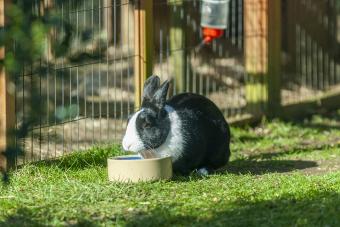
Before bringing any pet home, you want to know what your commitment will look like. If you're interested in a rabbit as a pet, it's important to know that their life expectancy can vary significantly. On average, most pet rabbits live between 7 and 10 years. However, your pet rabbit's lifespan depends on many things, including their breed, diet, weight, environment, and many other factors. Luckily, many of these are under your control. Make sure you give your rabbit the best care possible to help them live a long and happy life.
How Long do Popular Rabbit Breeds Live?
Historically, the larger the breed, the shorter the lifespan. However, there are always exceptions to this trend. The following are the average lifespans for the most common rabbit breeds kept as pets.
- Flemish Giant: 5 to 8 years
- American Rabbit: 8 to 12 years
- French Angora: 7 to 12 years
- English Lop: 5 to 8 years
- French Lop: 6 to 8 years
- Dutch Rabbit: 5 to 8 years
- English Spot: 5 to 9 years
- Miniature Lop: 7 to 14 years
- Lionhead Rabbit: 7 to 9 years
- Holland Lop: 7 to 10 years
- Rex Rabbit: 6 to 8 years
- Miniature Rex: 7 to 9 years
- Netherland Dwarf: 8 to 12 years
Factors Affecting Pet Rabbit Longevity
Even though a rabbit's breed can certainly contribute to their lifespan, it's not the only factor affecting how long they live. What you feed your rabbit, in addition to their enclosure type, cleanliness of their environment, activity level, and weight, all impact their health. Discover how you can improve each area to elevate your rabbit's life.

Diet
They say, "You are what you eat," so it's understandable that diet plays a big role in a pet rabbit's life expectancy. Without the right combination of nutrients and vitamins, a rabbit is prone to life-threatening health issues, such as overgrown teeth and gastrointestinal stasis.
A balanced rabbit diet should be made up of hay, vegetables, rabbit pellets, and constant access to fresh, clean water. However, young bunnies have different requirements compared to adults. Make sure you choose safe veggies and high-quality commercial products to help your pet thrive.
Environment
A rabbit habitat must be spacious, well-ventilated, clean, protected, and kept at an appropriate temperature. Unfortunately, a dirty, stuffy hutch can lead to respiratory illnesses, which can shorten their life. Likewise, if the enclosure isn't protected, predators could attack your beloved pet. Rabbits can tolerate low temperatures down to 40 degrees Fahrenheit, but they can easily overheat in environments above 80 degrees.
They also need adequate space within their cage to spread their legs, as well as supervised time (at least a few hours every day) to run and play in a larger area. It's possible to have a free-roaming rabbit who always has full access to your home. However, you'll need to bunny-proof your space to ensure they can't chew electrical cables or anything else that could hurt them.
Weight
Obesity is a problem among this species, as up to 35 percent of pet rabbits are overweight. Rabbits who carry too much weight are prone to health issues, such as heart disease, arthritis, hock sores, and skin problems. The correct diet, along with adequate exercise, is the best way to keep your rabbit at a healthy weight.
Similarly, being underweight can put your rabbit at risk for illnesses. A sudden drop in weight may indicate an underlying medical problem, so that's a sign to see your vet right away. If you're not sure whether your rabbit is overweight or underweight, you can ask your veterinarian for your bunny's body condition score, which grades their body composition on a scale of 1 to 5 (a score of 1 means a rabbit is emaciated, and a score of 5 means a rabbit is obese).
Reproductive Status
Spaying or neutering a rabbit might sound unusual, but it's a procedure that can extend your rabbit's life. Not only is the risk of reproduction removed when you have your rabbit altered, but you also eliminate their risk of reproductive cancers. Uterine cancer is particularly common in female rabbits. Reportedly over half of unspayed rabbits over the age of 3 years develop malignant uterine tumors. Not all veterinarians will perform this procedure, so you'll have to seek out an exotic vet who works with rabbits.
Activity Level
A rabbit may happily become a couch potato, but that's not wise for their health. Regular exercise is essential to keep your pet at a healthy weight, improve their skeletal structure, and keep their digestive tract moving. Rabbits should be let out of their cage for at least a few hours every day to play and roam.
If your rabbit isn't keen on exploring, you can promote exercise through toys, teach them tricks (with low-calorie treats as positive reinforcement), or set up a foraging obstacle course (where they must find treats you've hidden around the room). This is also a great opportunity for you and your rabbit to bond!
Genetics
Of course, genetics can play a role in life expectancy. Possible inherited disorders or genetic mutations can impact a rabbit's lifespan. In general, mixed-breed rabbits live longer than pure-breeds. However, any young rabbit may develop an aggressive cancer, whereas a littermate may live to the ripe age of 15 without ever being sick. It's impossible to say how long anyone will live, but you can certainly do your best to provide your pet with everything they need, so they have the best chance of living a long, rich life.
Extend Your Rabbit's Life with Compassionate Care
Rabbits are sensitive creatures who are very responsive to their environment. By providing them with an enriching and safe environment, nutritious diet, daily exercise, and regular veterinary visits, you can help extend your rabbit's life. And who doesn't want more happy years with their best friend?







